Investigative Stories
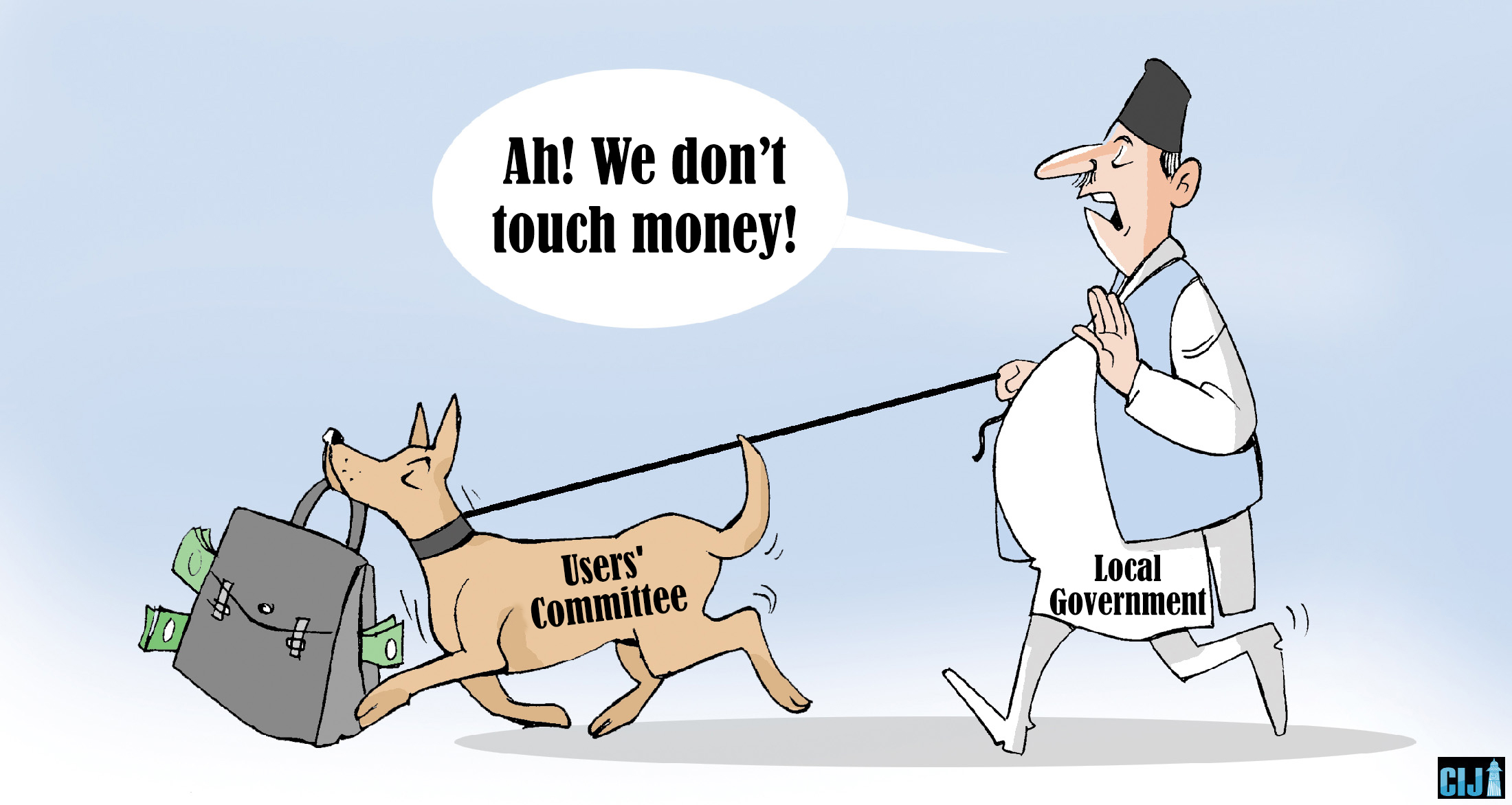
In Dhankuta Municipality, the users’ committees responsible for road cleaning in wards 9 and 10 handed over the responsibility to the private contractors. In the fiscal year 2080/81 alone, 11 projects were contracted under users’ committees, yet executed by four construction companies.
These projects, totaling Rs 3.1 million, bypassed competitive bidding process entirely, with the users’ committees acting as intermediaries. When asked about these irregularities, Mayor of Dhankuta Municipality, Chintan Tamang dismissed the claim, “Some of the irregularities pointed out by the Auditor General are merely theoretical,” he said, adding that improvements are being planned.
This practice of bypassing proper procedures, assigning work meant to be done through users' committees directly to contractors, is not unique to Dhankuta, it has spread across the country.
As per the Sub-rule 10 of Rule 97 of the Public Procurement Regulations 2064, the users’ committee has to complete the work obtained by it and cannot cause such work to be carried out from any construction company or subcontractor.
Yet the legal provision has not been followed. Across the country, 118 local governments have used users’ committee as a cover to assign 1,791 projects directly to construction companies. Such projects alone accounted for an expenditure of Rs 788.3 million according to the Office of the Auditor General (OAG).
Such practices restrict competition and open the door for collusive awarding of contracts. Sources from the Auditor General’s Office reveal how widespread the trend has become. The highest number of such irregularities were present in Bagmati Province with 35 local government implicated, followed by 32 in Koshi, 15 in Sudurpaschim, 13 in Karnali Province, 12 in Lumbini, 6 in Madhesh, and 5 in Gandaki Province.
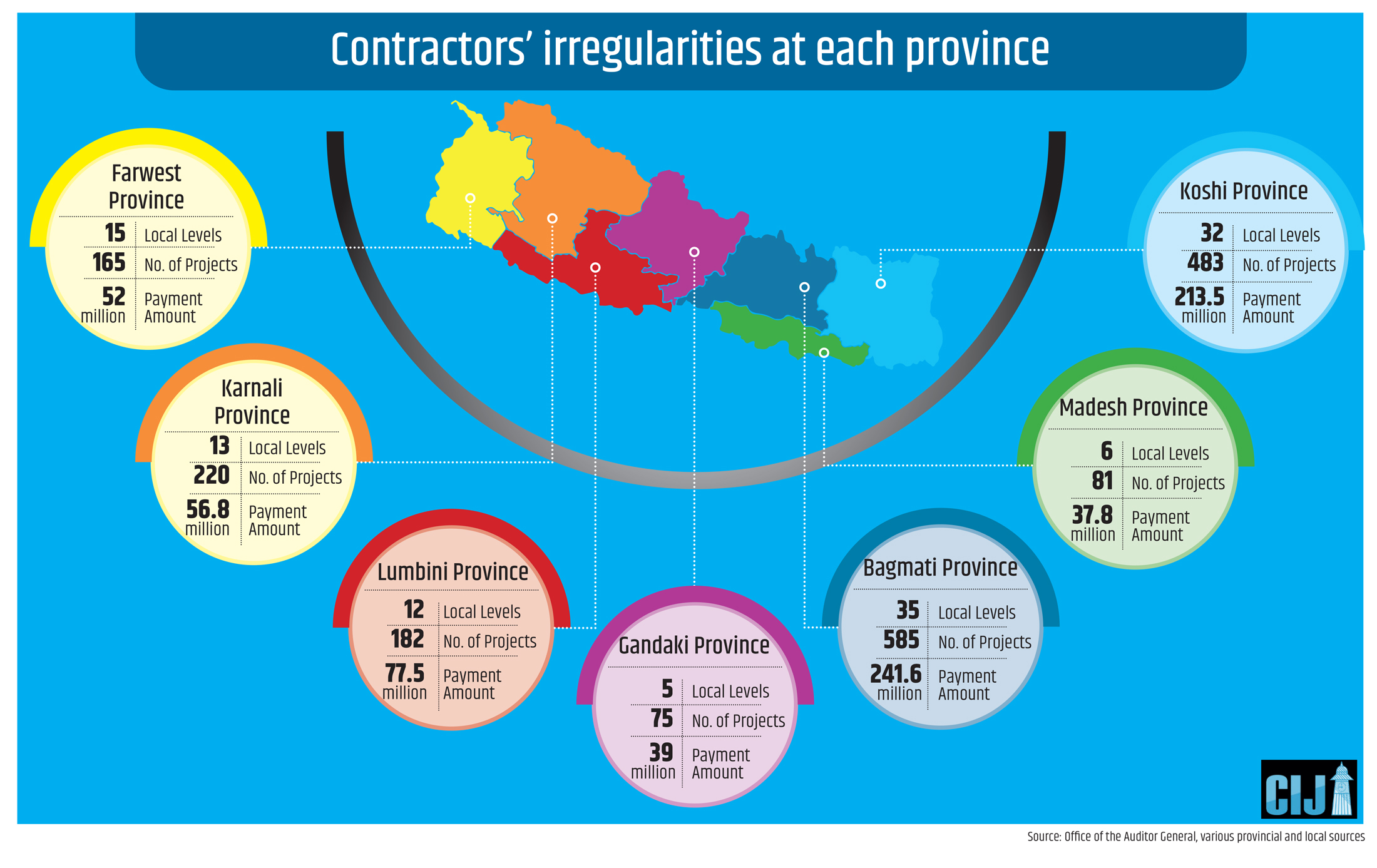
Complex Projects Handed Over to Users’ Committees
Nepal’s Public Procurement Regulations strictly prohibits the use of heavy machinery including loaders, excavators, rollers, dozers, graders, bitumen distributors, etc. in projects operated by the users’ committees. Yet in practice, such rules are being ignored.
In Budhinanda Municipality of Bajura, users’ committees were assigned technically complex projects such as the Khulmigaun Small Hydropower Project, electricity extension from Koltichaur to Swasthya Chaur, construction of the Rishidev AVI field, Kolti-Kuru road maintenance, Beldanda-Tadi road repair, and Pokhare-Bhimpani-Dandagau road construction. All of these projects involved the use of heavy machinery. The procedures of ensuring the technical oversight for such complex projects, which includes recommendations from the experts and approval from public authorities, were entirely skipped.
According to the Auditor General’s report, in the fiscal year 2080/81, 240 local governments across the country spent a total of Rs 1.98 billion by assigning large-scale projects requiring heavy equipment such as road upgrades, building construction, and motor road construction, to users’ committees. Local residents warn that when users’ committees operate complex machinery without trained technical staffs, the quality of construction suffers. The practice of renting heavy machinery also creates opportunities for irregularities.
A number of examples shows such practice is widespread across Nepal. Rishing Rural Municipality in Tanahun constructed the Kafaldanda-Hude and Deurali-Pipaldanda motorable roads through users’ committees, using heavy machineries such as dozers and loaders. In Jhapa’s Biratamod Municipality, construction of municipal office-building and black-topping of roads were carried out through users’ committees. Similarly, Katari Municipality in Udayapur carried out the installation of solar-powered water-pump systems and implemented electrical irrigation projects through users’ committees.
“Users’ Committee are being misused and recent practices has undermined their original purpose,” says Purnachandra Bhattarai, former Secretary of the Ministry of Local Development. Bhattarai, who is also a governance expert adds that these committees are often dominated by the contractors who pocket local government funds through collusive arrangements, often taking the percentage of the project cost.
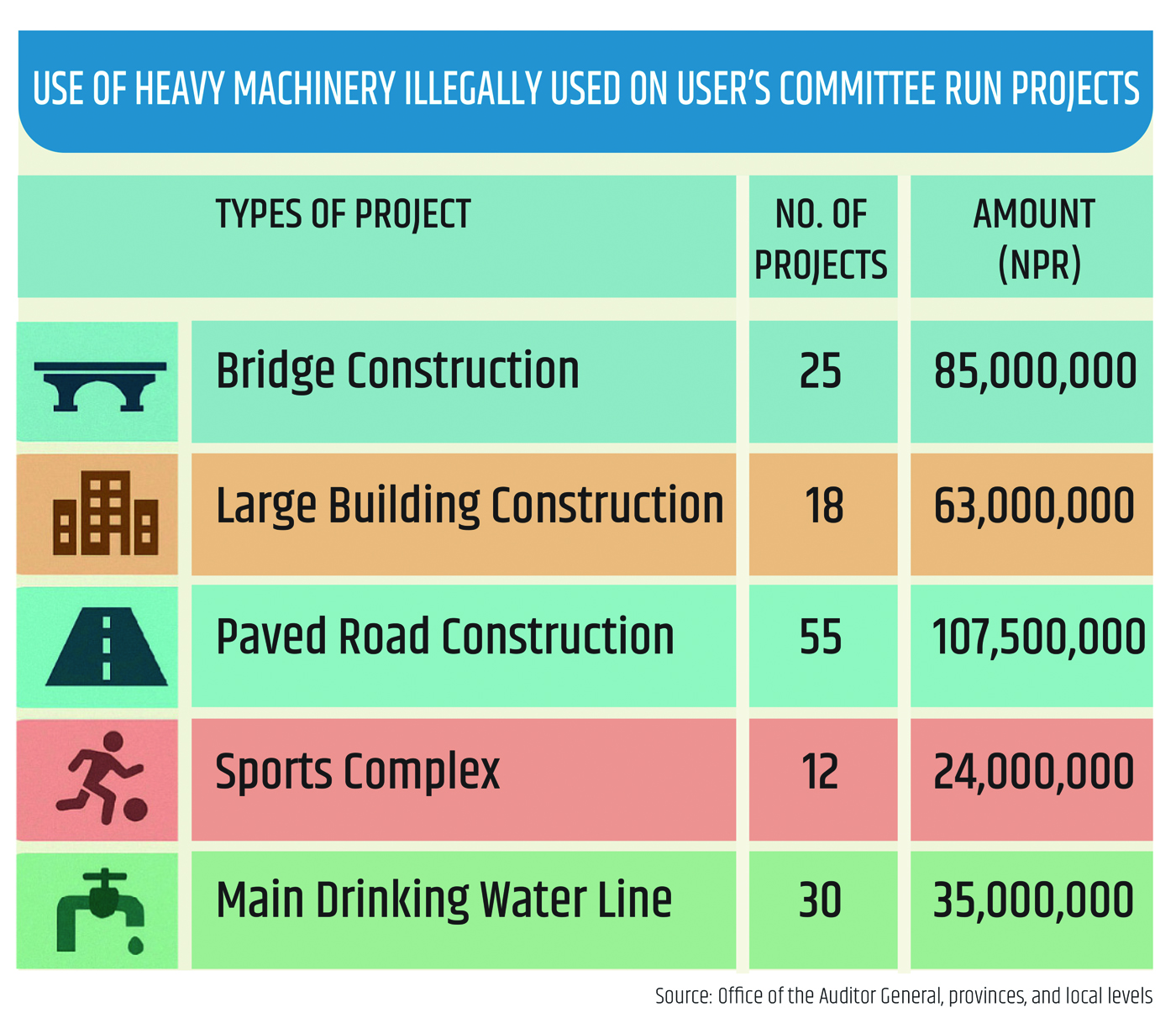
Direct Challenge to Laws and Regulations
Rule 97(1) of the Public Procurement Regulations, 2064 (2007) states that a users' committee can only manage projects costing up to Rs 10 million. Similarly, Sub-rule (4) mentions that this cost includes value-added tax (VAT), overhead, contingency, and the community participation amount.
However, building and garden construction of Birat Bharat Bishranti Recreation Center for senior citizens in Biratamod Municipality, Jhapa, was contracted to a users’ committee and paid Rs 9.945 million excluding VAT, overhead, and contingency. The total cost of the project amounts to Rs 12.461 million if VAT and overhead are added. Payments for this project was jointly made by the Terai-Madhesh Prosperity Program who contributed Rs 7 million and rest of the cost was included as contribution from the municipality.
Public Procurement Regulations 2064 mandates locals to contribute through financial or labor means while implementing the projects through user’s committees. The payments to users’ committee are to be made after deducting the part of their contribution. The purpose is to foster local ownership of projects and reduce the financial burden on the state.
In Dhanusha’s Sabaila Municipality, the amount of Rs 650,766 was paid to the users’ committee without the attendance which serve as proof of labor contribution, for constructing an agricultural road from private house of Rampukar Yadav’s through Murkutti Thaan to Balua Khola.
Many such examples of local governments making payments to users’ committee without deducting the value of labor contributions and producing inflated cost estimates are found across Nepal. In the fiscal year 2080/81 alone, 90 local governments paid for 493 projects without deducting the community participation portion as per the contracts.
Ramesh Subedi, Information Officer at the Office of the Auditor General, says that respective government institutions should regulate and take action against such irregularities.
“The Auditor General audits every government entity, and any issues identified are forwarded to the executive via parliament,” he explains. “The executive then acts in line with the recommendations endorsed by the parliament.” He further adds that many local governments have issued payments without deducting required contribution from the local consumers, an act that is illegal.
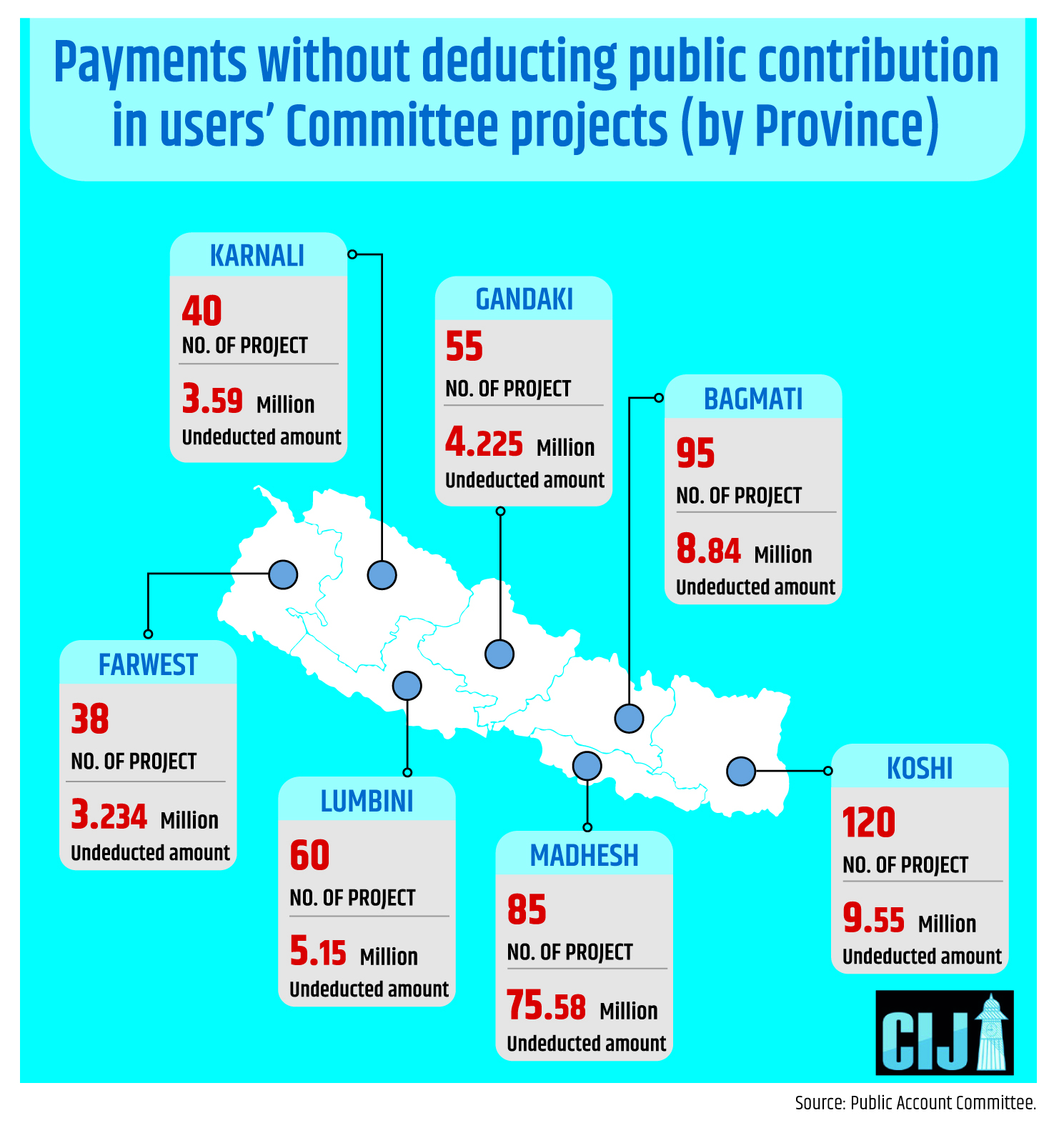
Consumer Committees: Showpiece or Smoke Screen?
The concept of executing development work through users’ committees was introduced to increase citizen ownership, generate employment, and make small projects easier to manage. It represents a positive aspect of decentralization and local community empowerment. However, in practice, this concept seems to have become a channel for financial mismanagement.
The Local Government Operation Act, 2074 (2017) assigns the formation, operation, and monitoring of users’ committees as the responsibility of wards which is why a significant portion of local development budgets flows through these committees. Yet, in practice, provisions of the Public Procurement Act and Regulations are frequently neglected during committee formation, project selection, contract awarding, and payments. The Auditor General’s report, 2082 (2025/26) highlighted this issue only in broad terms, without identifying specific cases.
Our study found that, with no clear criteria for selecting users’ committee members, these committees often include relatives of office-bearers, family members of ward chairs, or worker/members of ruling political parties.
On the surface, it looks normal to have political party workers/members or relatives of officials to be members of users' committees. But in reality, it is channeled the way that local officials often through their power make their own relatives to be appointed as members of these committees. These committees then work as intermediaries to hand over the project to construction companies. This creates collusive corruption and compromises the work quality. Hundreds of local governments are involved in such irregularities, with billions of rupees at stake.
Padmini Pradhananga, former Chairperson of Transparency International Nepal, calls the irregularities occurring in the name of user’s committees as a product of a kleptocratic system.
“Party affiliates manipulate committees’ formation to serve their own interests and carry out irregularities through them,” she says. “By misleading the committee members, the powerful are sneakily orchestrating corruption”, she adds.
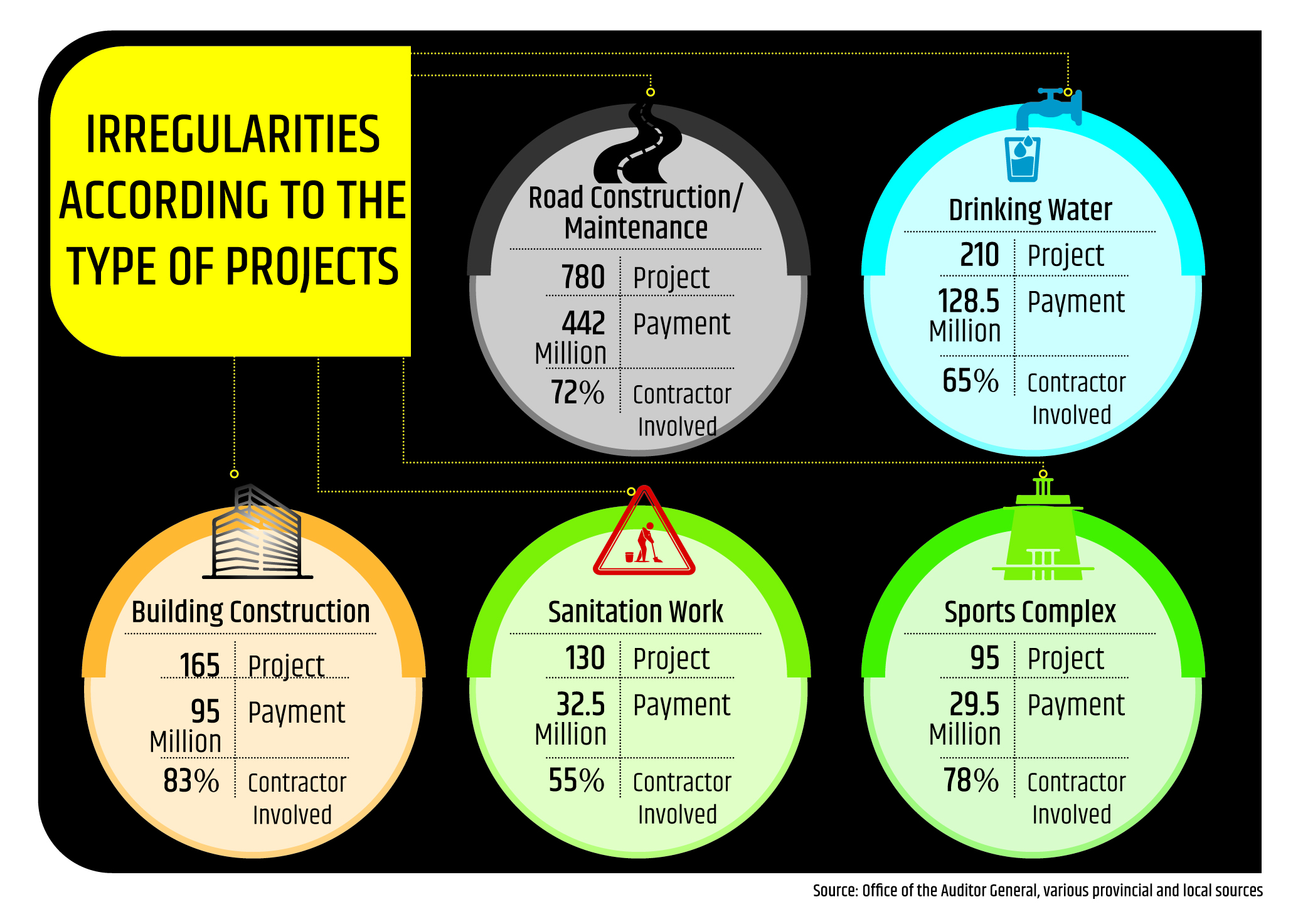
What makes this system thrive?
In the fiscal year 2080/81, the total audit irregularities of local governments reached Rs 2.532 billion. Our study shows that a significant portion of this amount is linked to corruption. This distortion is being facilitated from policymakers to local governments.
As per the procurement provision, projects under Rs 10 million can be assigned to local users’ committee without tender bidding process. Taking advantage of this provision, local elected representatives, and staff hand over the projects to the users’ committees formed by the persons who favors them. This way they keep certain percentage of commissions after the committee collusively hands over the project to the contractors.
Former secretary Bhattarai says that users’ committees are the easiest ways to please the party cadres/workers who supports these representatives during the election. As tender bidding process is open, there is less chances of knowing who might take over the projects while one can have their own ‘known’ people in the committee.
However, very few of those engaging in such irregularities face any action. The Auditor General’s Office continues to report audit irregularities, which increase year after year.
Rishikesh Pokhrel, Chairperson of the Public Accounts Committee of the House of Representatives, claims that the Auditor General is conducting a serious investigation into irregularities in the name of users’ committees.
“We have initiated in-depth study and investigation on this issue. Hopefully, this situation will be addressed in the next audit report,” Chairperson Pokhrel says. “We have sought the Ministry’s perspective on irregularities in users’ committees and are confident that improvements will soon be visible.”
Pradhananga, former chairperson of the Transparency International Nepal warns that organized exploitation of state funds in the name of users’ committees will continue unless the formation process of users’ committees are made transparent and people involved in fraudulent activities through users’ committees are brought under the law.
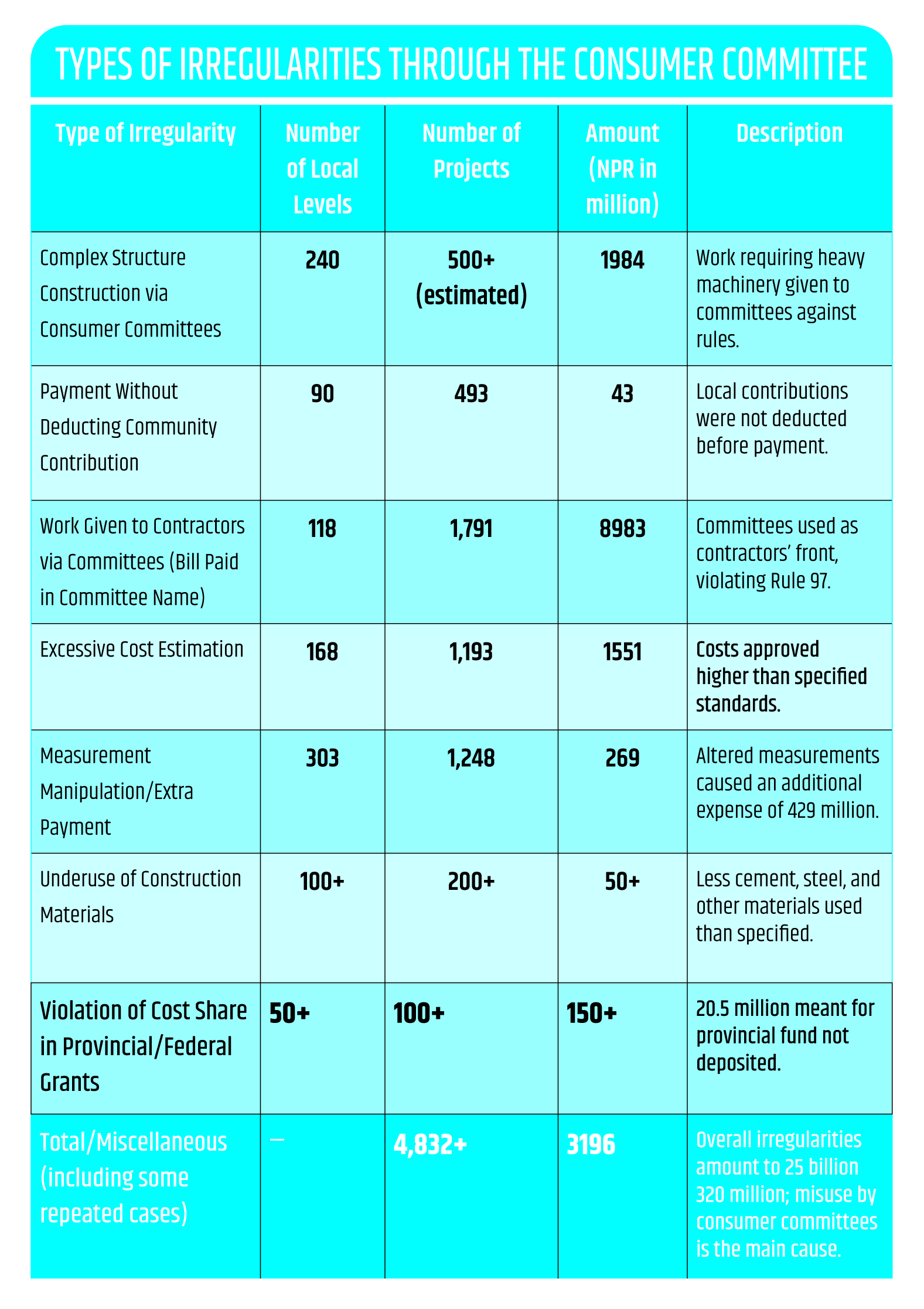
She further suggests that making users’ committees empowered will require mandatory legal provisions ensuring the transparent process in project selection, enforcing the provision of deducting the local labor contribution mandatory, making the financial report public and strict provision to cut ties with construction companies. She adds, “Otherwise, the risk of exploitation under the guise of committees will only grow.”
As per Bhattarai, lack of well-planned processes, inadequate human resources and overly flexible legal provision has fueled this distortion.
More Investigative Stories
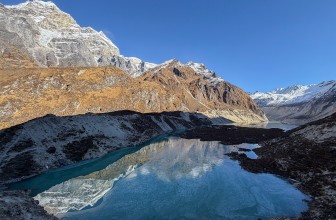
Hotter Himalaya melts glaciers
Villages in Manang live directly below a glacial lake that is in danger of bursting
Stray cattle continue to haunt Kailali and Kanchanpur streets despite massive investment to manage them
Streets and settlements in Kailali and Kanchanpur have been teeming with stray cattle for years, destroying crops and causing road...
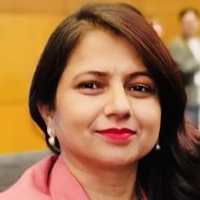
Comment Here